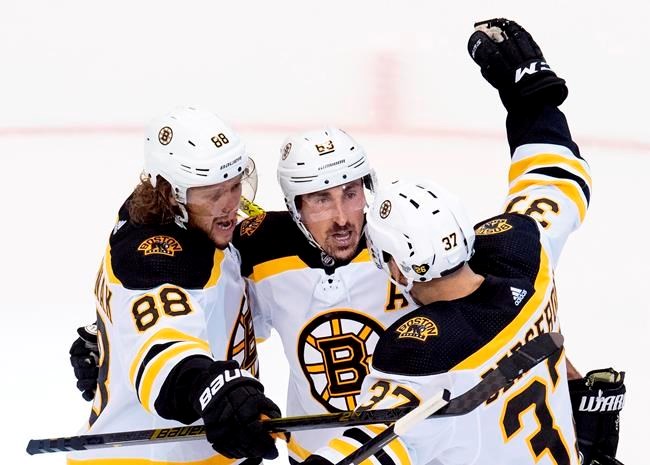TORONTO — Brad Marchand realizes now he didn't come close to fully grasping the magnitude of the moment.
Deep in his first playoff run with the Boston Bruins back in 2011 at age 23, he knew the stakes were high.
And after beating the Tampa Bay Lightning in seven games to advance to the Stanley Cup final, his team quickly found itself down 2-0 to the Vancouver Canucks in the best-of-seven title series.
"I didn't really, truly understand how big some of those games were," said Marchand, now 32. "I just went out and played."
The result was five goals and two assists in the next five contests — including three points in the decisive Game 7 — as Boston rallied to beat Vancouver and win the franchise's first championship since 1972.
"If I would have truly understood how big it was and what these games meant, I probably wouldn't have had the same mindset of just going and playing," Marchand continued. "I would have been nervous about what could happen, what the outcome could be."
The importance of experience on a team is hard to quantify. It's often pointed to when an organization fails to meet playoff expectations, with narratives and phrases like "learning how to win" or having "been there before" getting tossed around in the aftermath.
But what's the true value of experience?
With the second round of the NHL playoffs in full swing, just 21 players on clubs still alive in the tournament have Cup rings, and only 10 have lifted the trophy since 2015.
The last four champions — Pittsburgh (2016, 2017), Washington (2018) and St. Louis (2019) — have all been eliminated.
There's a sprinkling of veterans with Cup pedigree and others that have been part of long playoff runs across the remaining rosters, but in a league that continues to get younger, many players are in the thick of the fight for the first time.
"It's good to have experience in some ways," said Canucks head coach Travis Green, a former NHLer in his third season behind Vancouver's bench. "And also sometimes maybe it helps you when you (don't) and you don't know any better. That sometimes depends on the individual, the skill level of the individual, how they tick.
"People can get nervous in situations they haven't been in before. But also some people thrive on situations that they haven't been in before."
Vancouver's roster includes past Cup winners Tyler Toffoli, Tanner Pearson and Jay Beagle, but is led by the young core of Elias Pettersson, Quinn Hughes, Bo Horvat and Brock Boeser. Horvat was the only player from that group with any post-season experience prior to the NHL's summer restart to its pandemic-delayed campaign — six games with the Canucks as a rookie in 2015.
"We have a great mix of everything," said Horvat, the Canucks' 25-year-old captain. "We have guys that have had experience and young guys that are excited and willing to do whatever it takes.
"Experiences is huge. Guys who have been there and are veteran presence in the room, is really important in the playoffs. Just having those six games, it's not a ton of experience for me, but it definitely helps."
Philadelphia Flyers head coach Alain Vigneault, whose team has been backstopped by the stellar play of 22-year-old goalie Carter Hart, said every player in the NHL has been part of big games before.
These ones are just bigger.
"There's no doubt that having that playoff experience, knowing the demands and the mental and physical demands and the pressure (is important) ... but you have to go through it," Vigneault said. "We've got quite a few young players getting their first kick at the can."
Marchand said subsequent playoff failures after hoisting the Cup — including final losses in both 2013 and 2019 — make him more in tune with the importance of every bounce in a series.
"There's some games where my nerves were through the roof," said Marchand, who added the feeling is different in 2020 with arenas empty because of COVID-19. "I was almost sick to my stomach. Young guys, maybe they don't understand how big a game is or how big a turning point can be. If you're up or down a couple games and you let a game slip, and you haven't been through it and experienced it, you can take situations for granted.
"There's a lot of situations where experience goes a long way, but also being naive to those situations can help, too."
New York Islanders head coach Barry Trotz, who led Washington to its first Cup in 2018 after a string of playoff setbacks, said youth or a lack of battle scars aren't a problem until things get difficult.
"Experience is not necessary until you run into adversity," he said. "That's where experience comes in. From veteran players, how they handle the locker room, the emotions, their teammates, that's when it's essential. If you don't go through adversity as a young player, then it's fine to be young.
"But when you have to go through something that you've never gone through before, experience gives you a little bit of an edge."
"There's moments through a playoff run where that experience gives your group a level of composure," Vegas Golden Knights head coach Peter DeBoer added. "You don't necessarily have to have that ring pedigree."
Marchand said in the end, there's no one-size-fits-all answer.
"There's pros and cons to both, but the biggest thing is you can't overthink it. You have to go out there and play your game.
"Teams that play the best are gonna win. "
This report by The Canadian Press was first published Aug. 25, 2020.
___
Follow @JClipperton_CP on Twitter
Joshua Clipperton, The Canadian Press




